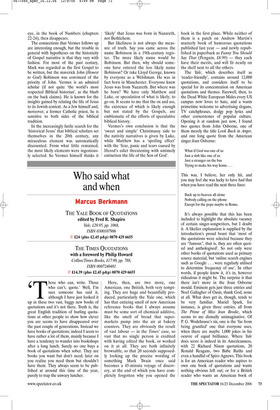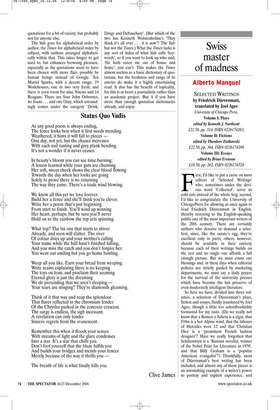Who said what and when
Marcus Berkmann
THE YALE BOOK OF QUOTATIONS edited by Fred R. Shapiro Yale, £29.95, pp. 1068, ISBN 0300107986 ✆ £24 (plus £2.45 p&p) 0870 429 6655 THE TIMES QUOTATIONS with a foreword by Philip Howard Collins/Times Books, £17.99, pp. 788, ISBN 0007240481 ✆ £14.39 (plus £2.45 p&p) 0870 429 6655 ‘T hose who can, write. Those who can’t, quote.’ Well, I’m sure someone has said it, although I have just looked it up in these two vast, baggy new books of quotations and it’s not there. Truth is, the great English tradition of hurling quotations at other people to show how clever you are seems to have disappeared over the past couple of generations. Instead we have books of quotations; indeed I seem to have rather a lot of them, mainly because I have a tendency to wander into bookshops after a long lunch. Surely no one buys a book of quotations when sober. They are books you want but don’t need; later on you realise you need them but shouldn’t have them. They always seem to be published at around this time of the year, purely to trap the unwary luncher. Here, then, are two more, one American, one British, both very tempting. They are huge and beautifully produced, particularly the Yale one, which has that enticing smell of new American reference books that I always assume must be some sort of chemical additive, like the smell of bread that supermarkets pump into the air at bakery counters. They are obviously the result of vast labour — in the Times’ case, so vast that no single person is credited with having edited the book, or worked on it at all. They are both infinitely browsable, so that 20 seconds supposedly looking up the precise wording of something Mark Twain once said becomes a 45-minute voyage of discovery, at the end of which you have completely forgotten why you opened the book in the first place. While neither of them is a patch on Andrew Martin’s masterly book of humorous quotations published last year — and newly republished in paperback as Funny You Should Say That (Penguin, £8.99) — they each have their merits, and will fit neatly on the shelf next to all the others.
The Yale, which describes itself as ‘reader-friendly’, contains around 12,000 quotations, and considers itself to be special for its concentration on American quotations and themes. Farewell, then, to the Dead White European Males every US campus now loves to hate, and a warm primetime welcome to advertising slogans, TV catchphrases, dodgy pop lyrics and other cornerstones of popular culture. Opening it at random just now, I found two quotes from John Osborne, one of them merely the title Look Back in Anger, and one long quote from the American singer Joan Osborne:
What if God was one of us Just a slob like one of us Just a stranger on the bus Trying to make his way home . . .
This was, I believe, her only hit, and you may feel she was lucky to have had that when you have read the next three lines:
Back up to heaven all alone Nobody calling on the phone Except for the pope maybe in Rome.
It’s always possible that this has been included to highlight the absolute vacancy of certain singer-songwriters, but I doubt it. A likelier explanation is supplied by the introduction’s proud boast that ‘most of the quotations were selected because they are “famous”, that is, they are often quoted and anthologised’. So not only were other books of quotations used as primary source material, but ‘online search engines such as Google . . . were regularly utilised to determine frequency of use’. In other words, if people know it, it’s in, however ridiculous it might be. The surprise is that there isn’t more in the Joan Osborne mould. Eminem gets just three entries and Noel Gallagher of Oasis, thank God, none at all. What does get in, though, tends to be very familiar. Muriel Spark, for instance, is given three entries, all from The Prime of Miss Jean Brodie, which seems to me dismally unimaginative. Of P. G. Wodehouse’s six, one is the ‘far from being gruntled’ one that everyone uses, when there are maybe 1,000 jokes in his oeuvre of equal brilliance. Where Yale does score is indeed in its Americanness, with 22 Richard Nixon quotations, 20 Ronald Reagans, two Babe Ruths and even a handful of Spiro Agnews. This book is for an American reader who aspires to own one book of quotations and wants nothing obvious left out; or for a British reader who wants an American book of quotations for a bit of variety; but probably not for anyone else.
The Yale goes for alphabetical order by author, the Times for alphabetical order by subject, with authors arranged alphabetically within that. This takes longer to get used to, but enhances browsing pleasure, especially as the quotations seem to have been chosen with more flair, possibly by human beings instead of Google. Ten Muriel Sparks, with a decent range; 19 Wodehouses, one or two very fresh; and there is even room for nine Nixons and 14 Reagans. There are four John Osbornes, no Joans . . . and one Ozzy, which astoundingly comes under the category ‘Drink, Drugs and Debauchery’. (But which of the two has Kenneth Wolstenholme’s ‘They think it’s all over . . . it is now’? The Yale but not the Times.) What the Times lacks is any sort of index of what Yale calls ‘keywords’, so if you want to look up who said, ‘He hath eaten me out of house and home’, you can’t. This makes the Times almost useless as a basic dictionary of quotations, but the freshness and range of its entries do make it a highly entertaining read. It also has the benefit of topicality, for this is at heart a journalistic rather than an academic project. Buy it if you have more than enough quotation dictionaries already, and enjoy.







































































































































 Previous page
Previous page